Advocacy Care Report for Disability Patient: NRS282 Assignment
VerifiedAdded on 2023/06/07
|7
|1593
|360
Report
AI Summary
This Advocacy Care Report analyzes the care of a disabled patient, adhering to Australian government procedures and policies. It explores the importance of advocacy in managing care for individuals with disabilities. The report details relevant policies and guidelines, including the development of position statements, submissions for public health inquiries, and maintaining relationships with healthcare stakeholders. It also outlines guidelines for attending medical appointments, asking questions, and providing necessary documentation. The report emphasizes ethical principles such as autonomy, non-maleficence, and beneficence, highlighting the nurse's role as an advocate. Furthermore, it discusses strategies for patient engagement and medical affairs, aiming to create an inclusive environment for disabled individuals. The conclusion summarizes the key practices, policies, ethical considerations, and strategies contributing to successful healthcare practices.
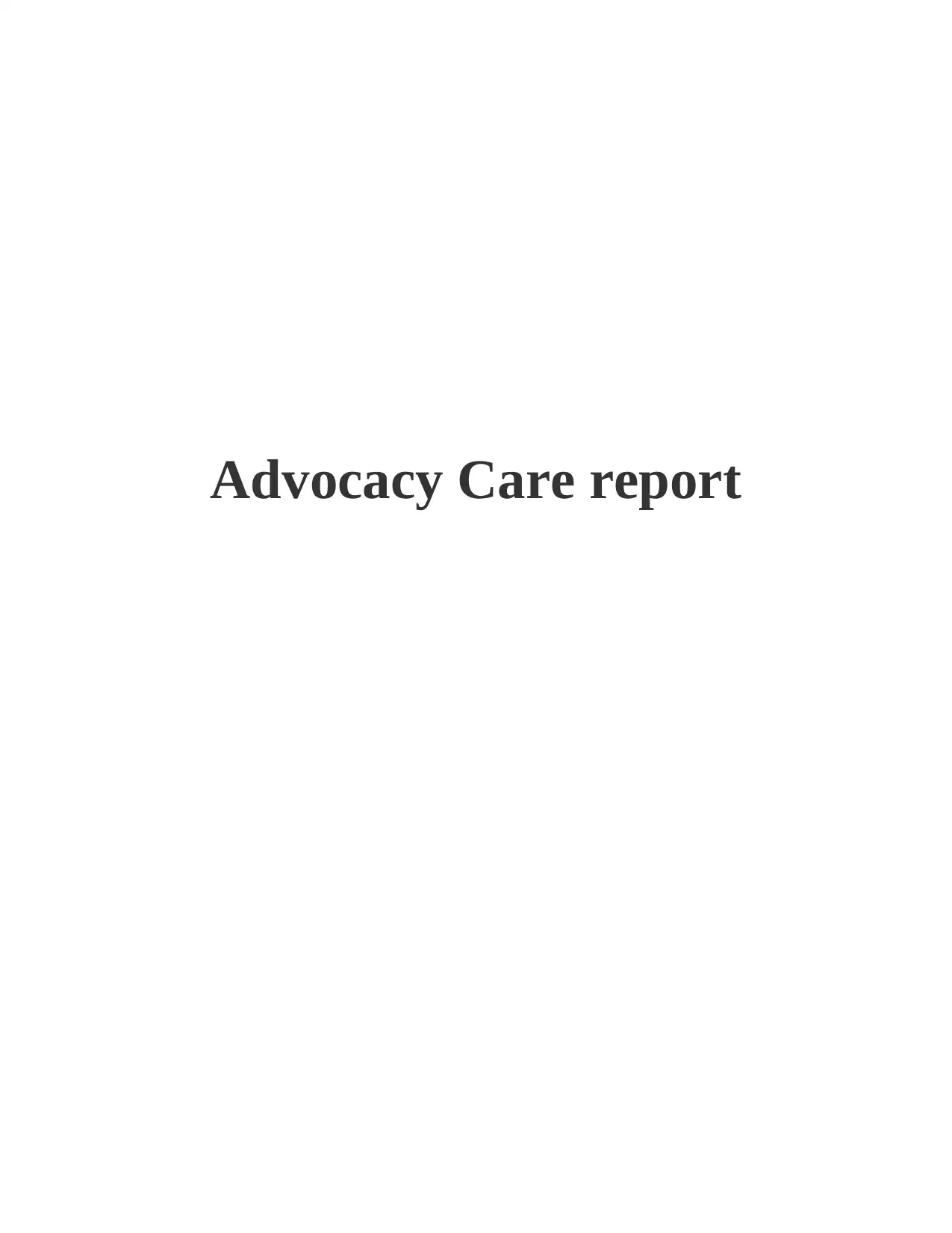
Advocacy Care report
Paraphrase This Document
Need a fresh take? Get an instant paraphrase of this document with our AI Paraphraser
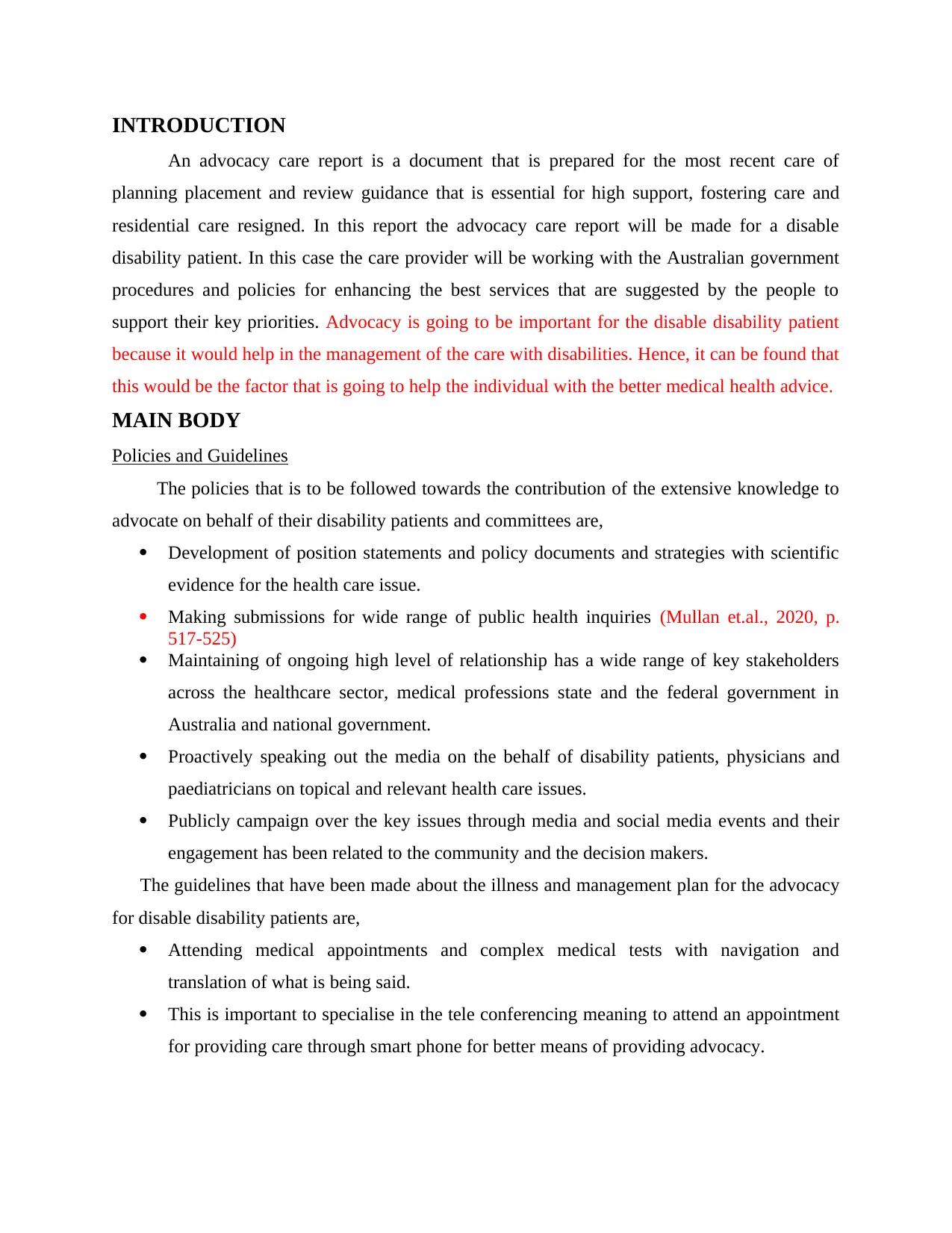
INTRODUCTION
An advocacy care report is a document that is prepared for the most recent care of
planning placement and review guidance that is essential for high support, fostering care and
residential care resigned. In this report the advocacy care report will be made for a disable
disability patient. In this case the care provider will be working with the Australian government
procedures and policies for enhancing the best services that are suggested by the people to
support their key priorities. Advocacy is going to be important for the disable disability patient
because it would help in the management of the care with disabilities. Hence, it can be found that
this would be the factor that is going to help the individual with the better medical health advice.
MAIN BODY
Policies and Guidelines
The policies that is to be followed towards the contribution of the extensive knowledge to
advocate on behalf of their disability patients and committees are,
Development of position statements and policy documents and strategies with scientific
evidence for the health care issue.
Making submissions for wide range of public health inquiries (Mullan et.al., 2020, p.
517-525)
Maintaining of ongoing high level of relationship has a wide range of key stakeholders
across the healthcare sector, medical professions state and the federal government in
Australia and national government.
Proactively speaking out the media on the behalf of disability patients, physicians and
paediatricians on topical and relevant health care issues.
Publicly campaign over the key issues through media and social media events and their
engagement has been related to the community and the decision makers.
The guidelines that have been made about the illness and management plan for the advocacy
for disable disability patients are,
Attending medical appointments and complex medical tests with navigation and
translation of what is being said.
This is important to specialise in the tele conferencing meaning to attend an appointment
for providing care through smart phone for better means of providing advocacy.
An advocacy care report is a document that is prepared for the most recent care of
planning placement and review guidance that is essential for high support, fostering care and
residential care resigned. In this report the advocacy care report will be made for a disable
disability patient. In this case the care provider will be working with the Australian government
procedures and policies for enhancing the best services that are suggested by the people to
support their key priorities. Advocacy is going to be important for the disable disability patient
because it would help in the management of the care with disabilities. Hence, it can be found that
this would be the factor that is going to help the individual with the better medical health advice.
MAIN BODY
Policies and Guidelines
The policies that is to be followed towards the contribution of the extensive knowledge to
advocate on behalf of their disability patients and committees are,
Development of position statements and policy documents and strategies with scientific
evidence for the health care issue.
Making submissions for wide range of public health inquiries (Mullan et.al., 2020, p.
517-525)
Maintaining of ongoing high level of relationship has a wide range of key stakeholders
across the healthcare sector, medical professions state and the federal government in
Australia and national government.
Proactively speaking out the media on the behalf of disability patients, physicians and
paediatricians on topical and relevant health care issues.
Publicly campaign over the key issues through media and social media events and their
engagement has been related to the community and the decision makers.
The guidelines that have been made about the illness and management plan for the advocacy
for disable disability patients are,
Attending medical appointments and complex medical tests with navigation and
translation of what is being said.
This is important to specialise in the tele conferencing meaning to attend an appointment
for providing care through smart phone for better means of providing advocacy.
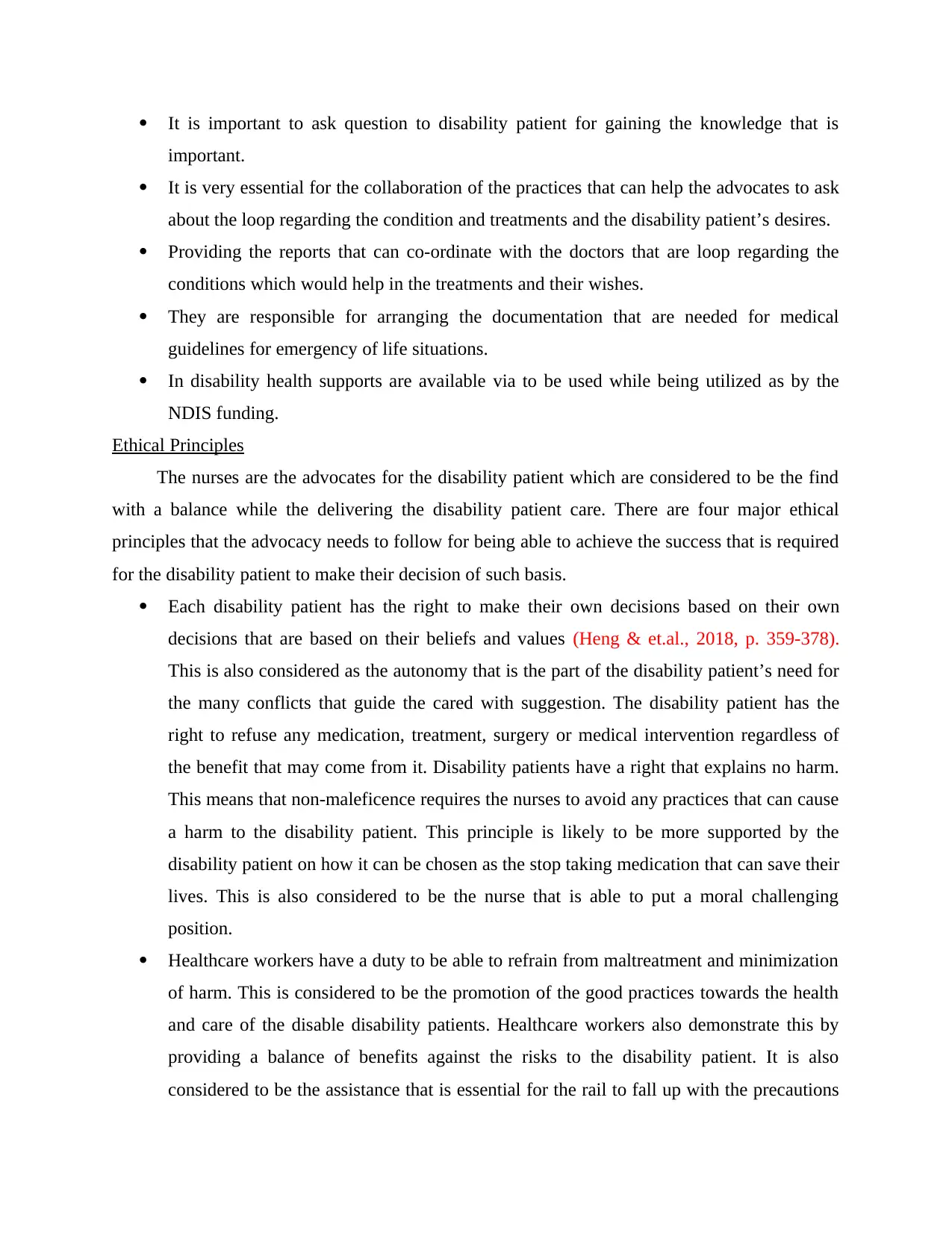
It is important to ask question to disability patient for gaining the knowledge that is
important.
It is very essential for the collaboration of the practices that can help the advocates to ask
about the loop regarding the condition and treatments and the disability patient’s desires.
Providing the reports that can co-ordinate with the doctors that are loop regarding the
conditions which would help in the treatments and their wishes.
They are responsible for arranging the documentation that are needed for medical
guidelines for emergency of life situations.
In disability health supports are available via to be used while being utilized as by the
NDIS funding.
Ethical Principles
The nurses are the advocates for the disability patient which are considered to be the find
with a balance while the delivering the disability patient care. There are four major ethical
principles that the advocacy needs to follow for being able to achieve the success that is required
for the disability patient to make their decision of such basis.
Each disability patient has the right to make their own decisions based on their own
decisions that are based on their beliefs and values (Heng & et.al., 2018, p. 359-378).
This is also considered as the autonomy that is the part of the disability patient’s need for
the many conflicts that guide the cared with suggestion. The disability patient has the
right to refuse any medication, treatment, surgery or medical intervention regardless of
the benefit that may come from it. Disability patients have a right that explains no harm.
This means that non-maleficence requires the nurses to avoid any practices that can cause
a harm to the disability patient. This principle is likely to be more supported by the
disability patient on how it can be chosen as the stop taking medication that can save their
lives. This is also considered to be the nurse that is able to put a moral challenging
position.
Healthcare workers have a duty to be able to refrain from maltreatment and minimization
of harm. This is considered to be the promotion of the good practices towards the health
and care of the disable disability patients. Healthcare workers also demonstrate this by
providing a balance of benefits against the risks to the disability patient. It is also
considered to be the assistance that is essential for the rail to fall up with the precautions
important.
It is very essential for the collaboration of the practices that can help the advocates to ask
about the loop regarding the condition and treatments and the disability patient’s desires.
Providing the reports that can co-ordinate with the doctors that are loop regarding the
conditions which would help in the treatments and their wishes.
They are responsible for arranging the documentation that are needed for medical
guidelines for emergency of life situations.
In disability health supports are available via to be used while being utilized as by the
NDIS funding.
Ethical Principles
The nurses are the advocates for the disability patient which are considered to be the find
with a balance while the delivering the disability patient care. There are four major ethical
principles that the advocacy needs to follow for being able to achieve the success that is required
for the disability patient to make their decision of such basis.
Each disability patient has the right to make their own decisions based on their own
decisions that are based on their beliefs and values (Heng & et.al., 2018, p. 359-378).
This is also considered as the autonomy that is the part of the disability patient’s need for
the many conflicts that guide the cared with suggestion. The disability patient has the
right to refuse any medication, treatment, surgery or medical intervention regardless of
the benefit that may come from it. Disability patients have a right that explains no harm.
This means that non-maleficence requires the nurses to avoid any practices that can cause
a harm to the disability patient. This principle is likely to be more supported by the
disability patient on how it can be chosen as the stop taking medication that can save their
lives. This is also considered to be the nurse that is able to put a moral challenging
position.
Healthcare workers have a duty to be able to refrain from maltreatment and minimization
of harm. This is considered to be the promotion of the good practices towards the health
and care of the disable disability patients. Healthcare workers also demonstrate this by
providing a balance of benefits against the risks to the disability patient. It is also
considered to be the assistance that is essential for the rail to fall up with the precautions
⊘ This is a preview!⊘
Do you want full access?
Subscribe today to unlock all pages.

Trusted by 1+ million students worldwide
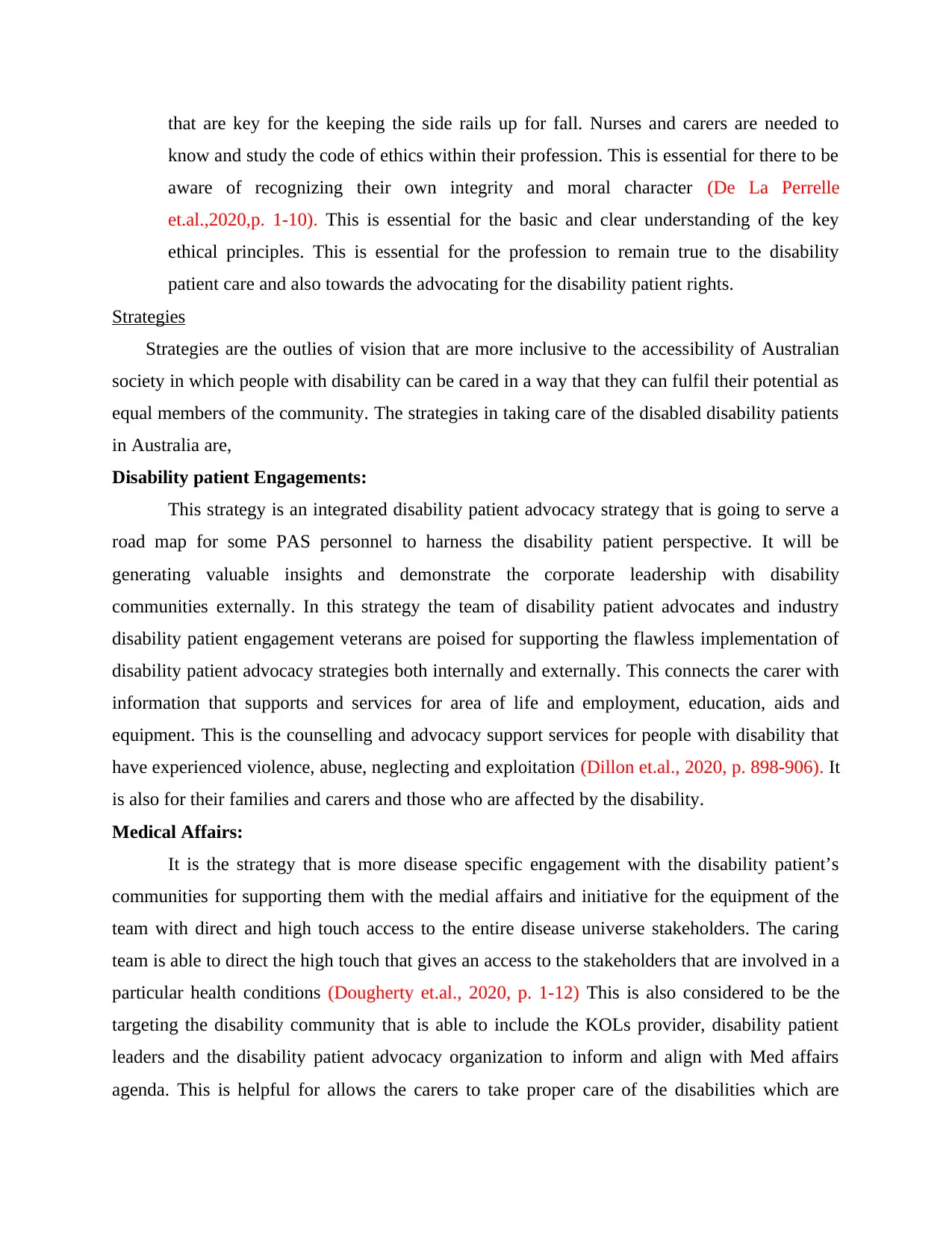
that are key for the keeping the side rails up for fall. Nurses and carers are needed to
know and study the code of ethics within their profession. This is essential for there to be
aware of recognizing their own integrity and moral character (De La Perrelle
et.al.,2020,p. 1-10). This is essential for the basic and clear understanding of the key
ethical principles. This is essential for the profession to remain true to the disability
patient care and also towards the advocating for the disability patient rights.
Strategies
Strategies are the outlies of vision that are more inclusive to the accessibility of Australian
society in which people with disability can be cared in a way that they can fulfil their potential as
equal members of the community. The strategies in taking care of the disabled disability patients
in Australia are,
Disability patient Engagements:
This strategy is an integrated disability patient advocacy strategy that is going to serve a
road map for some PAS personnel to harness the disability patient perspective. It will be
generating valuable insights and demonstrate the corporate leadership with disability
communities externally. In this strategy the team of disability patient advocates and industry
disability patient engagement veterans are poised for supporting the flawless implementation of
disability patient advocacy strategies both internally and externally. This connects the carer with
information that supports and services for area of life and employment, education, aids and
equipment. This is the counselling and advocacy support services for people with disability that
have experienced violence, abuse, neglecting and exploitation (Dillon et.al., 2020, p. 898-906). It
is also for their families and carers and those who are affected by the disability.
Medical Affairs:
It is the strategy that is more disease specific engagement with the disability patient’s
communities for supporting them with the medial affairs and initiative for the equipment of the
team with direct and high touch access to the entire disease universe stakeholders. The caring
team is able to direct the high touch that gives an access to the stakeholders that are involved in a
particular health conditions (Dougherty et.al., 2020, p. 1-12) This is also considered to be the
targeting the disability community that is able to include the KOLs provider, disability patient
leaders and the disability patient advocacy organization to inform and align with Med affairs
agenda. This is helpful for allows the carers to take proper care of the disabilities which are
know and study the code of ethics within their profession. This is essential for there to be
aware of recognizing their own integrity and moral character (De La Perrelle
et.al.,2020,p. 1-10). This is essential for the basic and clear understanding of the key
ethical principles. This is essential for the profession to remain true to the disability
patient care and also towards the advocating for the disability patient rights.
Strategies
Strategies are the outlies of vision that are more inclusive to the accessibility of Australian
society in which people with disability can be cared in a way that they can fulfil their potential as
equal members of the community. The strategies in taking care of the disabled disability patients
in Australia are,
Disability patient Engagements:
This strategy is an integrated disability patient advocacy strategy that is going to serve a
road map for some PAS personnel to harness the disability patient perspective. It will be
generating valuable insights and demonstrate the corporate leadership with disability
communities externally. In this strategy the team of disability patient advocates and industry
disability patient engagement veterans are poised for supporting the flawless implementation of
disability patient advocacy strategies both internally and externally. This connects the carer with
information that supports and services for area of life and employment, education, aids and
equipment. This is the counselling and advocacy support services for people with disability that
have experienced violence, abuse, neglecting and exploitation (Dillon et.al., 2020, p. 898-906). It
is also for their families and carers and those who are affected by the disability.
Medical Affairs:
It is the strategy that is more disease specific engagement with the disability patient’s
communities for supporting them with the medial affairs and initiative for the equipment of the
team with direct and high touch access to the entire disease universe stakeholders. The caring
team is able to direct the high touch that gives an access to the stakeholders that are involved in a
particular health conditions (Dougherty et.al., 2020, p. 1-12) This is also considered to be the
targeting the disability community that is able to include the KOLs provider, disability patient
leaders and the disability patient advocacy organization to inform and align with Med affairs
agenda. This is helpful for allows the carers to take proper care of the disabilities which are
Paraphrase This Document
Need a fresh take? Get an instant paraphrase of this document with our AI Paraphraser
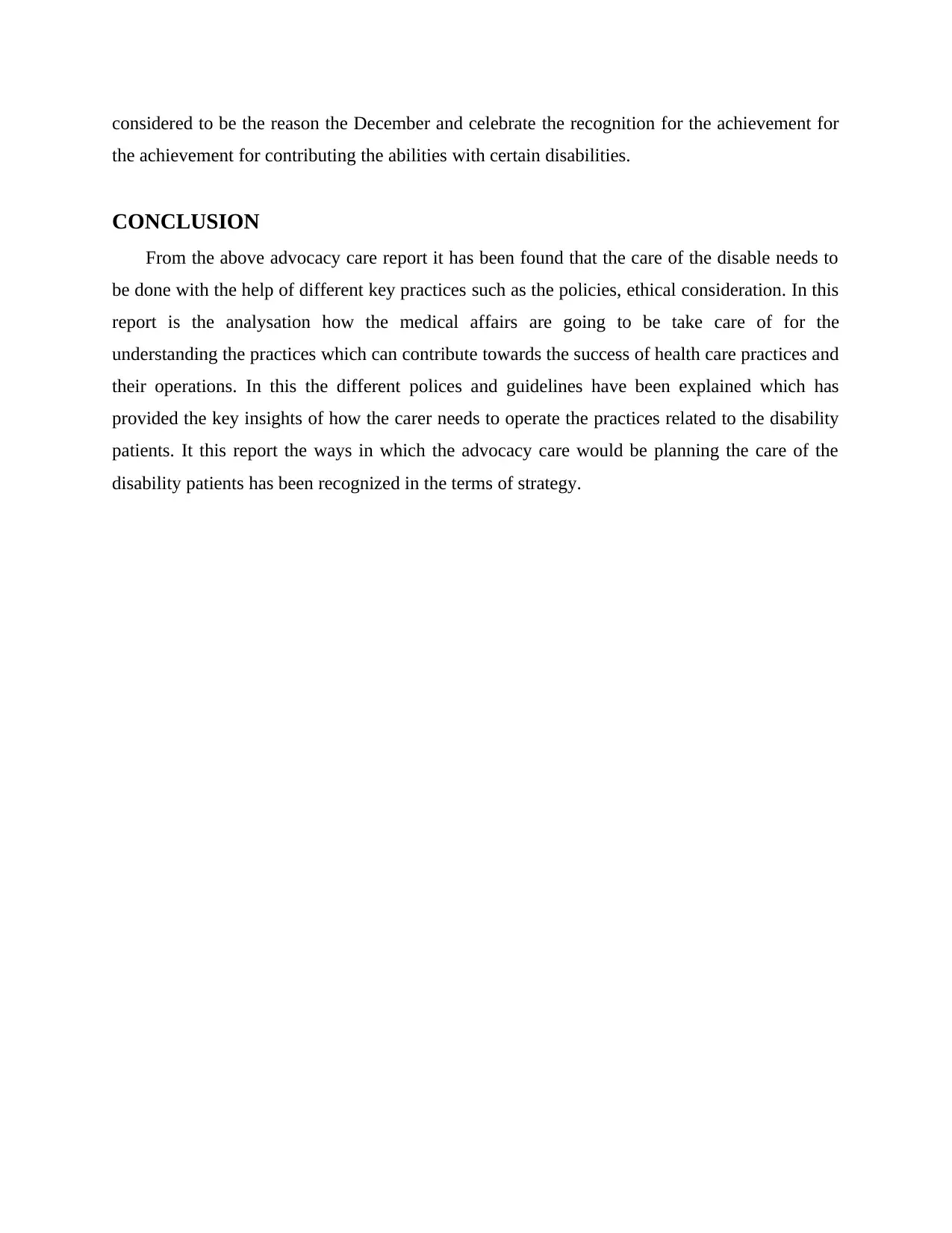
considered to be the reason the December and celebrate the recognition for the achievement for
the achievement for contributing the abilities with certain disabilities.
CONCLUSION
From the above advocacy care report it has been found that the care of the disable needs to
be done with the help of different key practices such as the policies, ethical consideration. In this
report is the analysation how the medical affairs are going to be take care of for the
understanding the practices which can contribute towards the success of health care practices and
their operations. In this the different polices and guidelines have been explained which has
provided the key insights of how the carer needs to operate the practices related to the disability
patients. It this report the ways in which the advocacy care would be planning the care of the
disability patients has been recognized in the terms of strategy.
the achievement for contributing the abilities with certain disabilities.
CONCLUSION
From the above advocacy care report it has been found that the care of the disable needs to
be done with the help of different key practices such as the policies, ethical consideration. In this
report is the analysation how the medical affairs are going to be take care of for the
understanding the practices which can contribute towards the success of health care practices and
their operations. In this the different polices and guidelines have been explained which has
provided the key insights of how the carer needs to operate the practices related to the disability
patients. It this report the ways in which the advocacy care would be planning the care of the
disability patients has been recognized in the terms of strategy.

⊘ This is a preview!⊘
Do you want full access?
Subscribe today to unlock all pages.

Trusted by 1+ million students worldwide
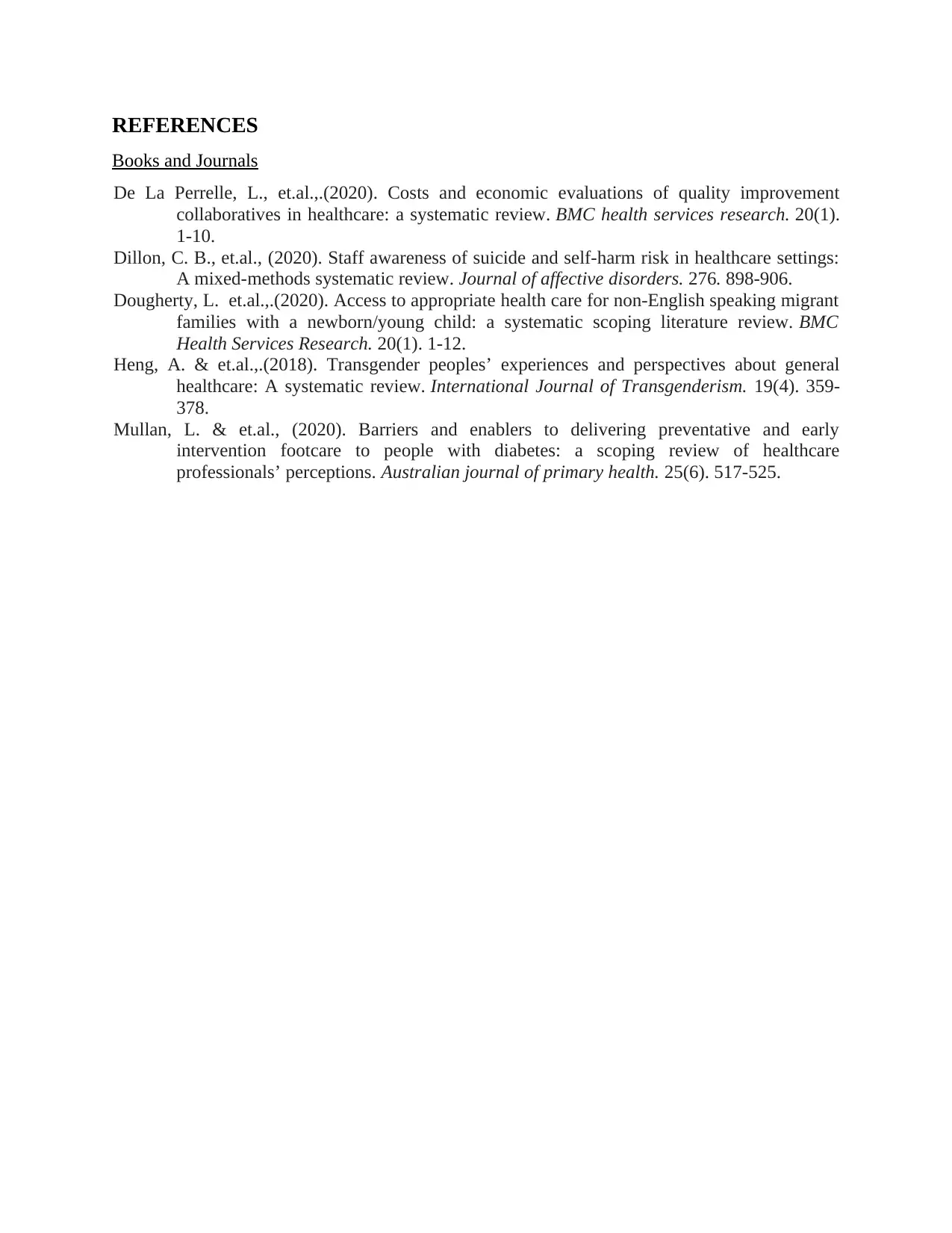
REFERENCES
Books and Journals
De La Perrelle, L., et.al.,.(2020). Costs and economic evaluations of quality improvement
collaboratives in healthcare: a systematic review. BMC health services research. 20(1).
1-10.
Dillon, C. B., et.al., (2020). Staff awareness of suicide and self-harm risk in healthcare settings:
A mixed-methods systematic review. Journal of affective disorders. 276. 898-906.
Dougherty, L. et.al.,.(2020). Access to appropriate health care for non-English speaking migrant
families with a newborn/young child: a systematic scoping literature review. BMC
Health Services Research. 20(1). 1-12.
Heng, A. & et.al.,.(2018). Transgender peoples’ experiences and perspectives about general
healthcare: A systematic review. International Journal of Transgenderism. 19(4). 359-
378.
Mullan, L. & et.al., (2020). Barriers and enablers to delivering preventative and early
intervention footcare to people with diabetes: a scoping review of healthcare
professionals’ perceptions. Australian journal of primary health. 25(6). 517-525.
Books and Journals
De La Perrelle, L., et.al.,.(2020). Costs and economic evaluations of quality improvement
collaboratives in healthcare: a systematic review. BMC health services research. 20(1).
1-10.
Dillon, C. B., et.al., (2020). Staff awareness of suicide and self-harm risk in healthcare settings:
A mixed-methods systematic review. Journal of affective disorders. 276. 898-906.
Dougherty, L. et.al.,.(2020). Access to appropriate health care for non-English speaking migrant
families with a newborn/young child: a systematic scoping literature review. BMC
Health Services Research. 20(1). 1-12.
Heng, A. & et.al.,.(2018). Transgender peoples’ experiences and perspectives about general
healthcare: A systematic review. International Journal of Transgenderism. 19(4). 359-
378.
Mullan, L. & et.al., (2020). Barriers and enablers to delivering preventative and early
intervention footcare to people with diabetes: a scoping review of healthcare
professionals’ perceptions. Australian journal of primary health. 25(6). 517-525.
1 out of 7
Related Documents
Your All-in-One AI-Powered Toolkit for Academic Success.
+13062052269
info@desklib.com
Available 24*7 on WhatsApp / Email
![[object Object]](/_next/static/media/star-bottom.7253800d.svg)
Unlock your academic potential
Copyright © 2020–2026 A2Z Services. All Rights Reserved. Developed and managed by ZUCOL.





